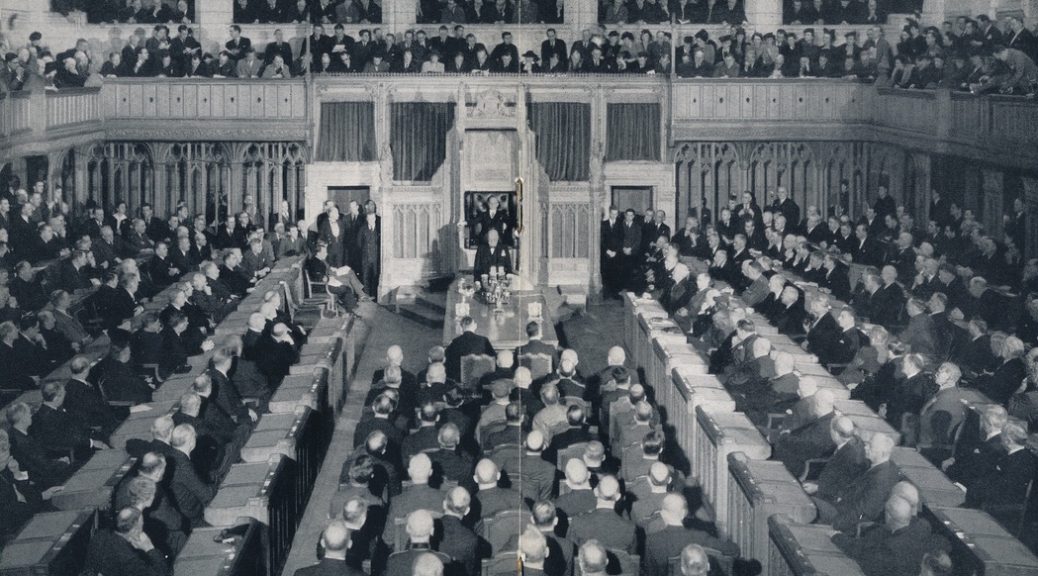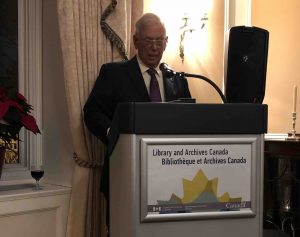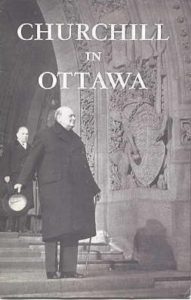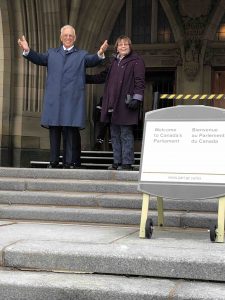
Churchill, Canada and the Perspective of History (Part 3)
 Perspective of History: Address to the Churchill Society of Ottawa, Ontario, Canada, on Sir Winston’s 144th birthday, 30 November 2018 (Part 3). We were kindly hosted at Earnscliffe by the British High Commissioner, Susan le Jeune d’Allegeershecque.
Perspective of History: Address to the Churchill Society of Ottawa, Ontario, Canada, on Sir Winston’s 144th birthday, 30 November 2018 (Part 3). We were kindly hosted at Earnscliffe by the British High Commissioner, Susan le Jeune d’Allegeershecque.
Perspective, 144 Years On
Concluded from Part 2…. “The great movements that underlie history—the development of science, industry, culture, social and political structures—are powerful, almost determinant,” wrote Charles Krauthammer.
Yet every once in a while, a single person arises without whom everything would be different. In recent times, only Churchill carries that absolutely required criterion: indispensability… Take away Churchill in 1940 [and] Hitler would have achieved what no other tyrant, not even Napoleon, had ever achieved: mastery of Europe. Civilization would have descended into a darkness the likes of which it had never known.
Churchill was, of course, not sufficient in bringing victory over Nazi barbarism, but he was uniquely necessary He then immediately rose to warn prophetically against its sister barbarism, Soviet communism. Churchill is now disparaged for not sharing our multicultural modern sensibilities. His disrespect for the suffrage movement, his disdain for Gandhi, his resistance to decolonization are undeniable.
But that kind of perspective is akin to dethroning Lincoln as the greatest of 19th century Americans because he shared many of his era’s appalling prejudices. In essence, the rap on Churchill is that he was a 19th century man parachuted into the 20th. But is that not precisely to the point? It took a 19th century man—traditional in habit, rational in thought, conservative in temper—to save the 20th century from itself.
* * *
The originality of the past century lay in its politics. It invented the police state and the command economy, mass mobilization and mass propaganda, mechanized murder and routinized terror—a breathtaking catalog of political creativity. And who is the hero of that story? Who slew the dragon? Yes, it was the ordinary person, the taxpayer, the grunt who fought and won the wars. Yes, it was the great leaders: Roosevelt, Mackenzie King, de Gaulle, Truman, John Paul II, Reagan, Thatcher. But above all, victory required one man without whom the fight would have been lost at the beginning.
And we have his words, digital and in print: 20 million of them, once The Churchill Documents are complete, spanning an age from the cavalry charge at Omdurman to astronauts on the moon. Remember, when Neil Armstrong stepped off his lunar lander, Churchill’s books were still being published posthumously. As they are still.
“The roar when we pronounce his name…”
William F. Buckley Jr. spoke about those words to us in Boston—is it possible?—almost a quarter century ago. “It was not,” he said,
the significance of victory, mighty and glorious though it was, that causes the name of Churchill to make the blood run a little faster. It is the roar that we hear when we pronounce his name. It is simply mistaken that battles are necessarily more important than the words that summon us to arms…. The Battle of Agincourt was long forgotten as a geopolitical event, but the words of Henry V, with Shakespeare to recall them, are imperishable in the mind, even as which side won the Battle of Gettysburg will dim from the memory of men and women who will never forget the words spoken about that battle by Abraham Lincoln. The genius of Churchill was his union of affinities of the heart and mind; the total fusion of animal and spiritual energy.
Churchill’s words were indispensable to that hour, Britain’s finest, whatever the glories or disappointments that came after. And so today the perspective of history on Winston Churchill is unchanged from half a century ago.
“He sweetened English life”
Why is that? Several explanations. One answer is by the chemist and novelist C.P. Snow:
A bad thing is the ability to sense what everyone else is thinking and think like them,” Snow said. “This Churchill never had, and would have despised himself for having. A good thing is the ability to think of many matters at once, their interdependence, their relative importance and their consequences…. Not many have such insight. He did. That was why he could keep us going when we were alone. Where it mattered most, there he was right.
And Snow reminds of today when he says: “People wanted something to admire that seemed to be slipping out of the grit of everyday. Whatever could be said against him, he had virtues, graces, style. Courage, magnanimity, loyalty, wit, gallantry—these are not often held up for admiration. He really had them. I believe that it was deep intuition which made people feel that his existence had sweetened English life.”
“Nothing Surpasses 1940”
Churchill did build his own myth. And he said himself: “Nothing surpasses 1940.” Nineteen forty dominates his reputation: ask any politician who admires him, and they all speak of his finest hour. Regardless of a career that lasted half a century. Despite holding almost every high office, writing fifty books and two-thousand speeches; despite the most imperishable words in English since Shakespeare—there stands 1940.
It is a tremendously powerful image. We see him in the shattered streets of blacked out London—or sitting on a rooftops, defying the Luftwaffe—sometimes seated on a chimney, smoking out those in offices below. He included Canada when he said those were the greatest days our peoples have lived. And there he remains, in a romantic chamber of the heart, where it is always 1940.
“Civilization”
But there is more perspective to Churchill than that, as we constantly preach to those who know only 1940. It is his statesmanship, his devotion to liberty. That’s the perspective of Hillsdale College, Andrew Roberts, and so many others, and should drive societies like this one. 1940 is part of it—but really just a derivation. Here’s Dr. Larry Arnn on Churchill’s thought and statesmanship. See what you think of it.
What he wanted to preserve was, actually, civilization. If you think about that word it means Rembrandt and Plato and Shakespeare. But before that and first, it is cognate with the word for citizen. It means the rule of civilians. In 1938 when Hitler ruled, that’s what Churchill said it meant, in a beautiful commencement address. You should all go read it. It’s on our website. It’s about this long, and it’s one of the prettiest things he ever said.
And he said, what does it mean, civilization? It means that consent of the governed, the rule of law, is central every thing that we mean by civilization. And force—the strongest in the land—does not rule. It means we rule. Ordinary folk.
And there is good reason to think their common sense is still intact. And you can study the career of Winston Churchill—a monarchist, and an imperialist—and find many places where he said, over and over, that in the end, only the people are going to get it right. Because they have a right to. Because they are equal souls, and may not be governed except with their consent. That’s what I think is at stake. In 2018, as in 1940. That’s what the rule of law means. I think that’s what we could be losing.
Be For That…


I think Churchill’s admirers today should be for that. And they should adopt whatever are the best means in front of them to get that. I think that should be the main focus of Churchill studies, as he passes from the hero of 1940 to the ranks of the great thinkers on statesmanship.
I’ll end with the aforementioned Bill Rusher, speaking to us in Banff. He quoted Coventry Patmore, a 19th century poet who, like Churchill, and General Wolfe of Quebec fame, lived in Westerham. Sir Winston said: “The Romans have often forestalled many of my best ideas by thinking of them first.” Similarly, I concede my best ideas to others smarter than me, to Larry Arnn, Bill Rusher, and Coventry Patmore.
“As long as humanity admires courage, eloquence and tenacity,” Bill Rusher said, “Churchill will be remembered and honored—and these are virtues which will come into fashion again, ladies and gentlemen. That is why he would enjoy a little quatrain by Patmore. I always like to end my talks with it, because it is upbeat, optimistic and true.
For want of me the world’s course will not fail.
When all its work is done, the lie shall rot.
The Truth is great and shall prevail,
When none cares whether it prevail, or not.






